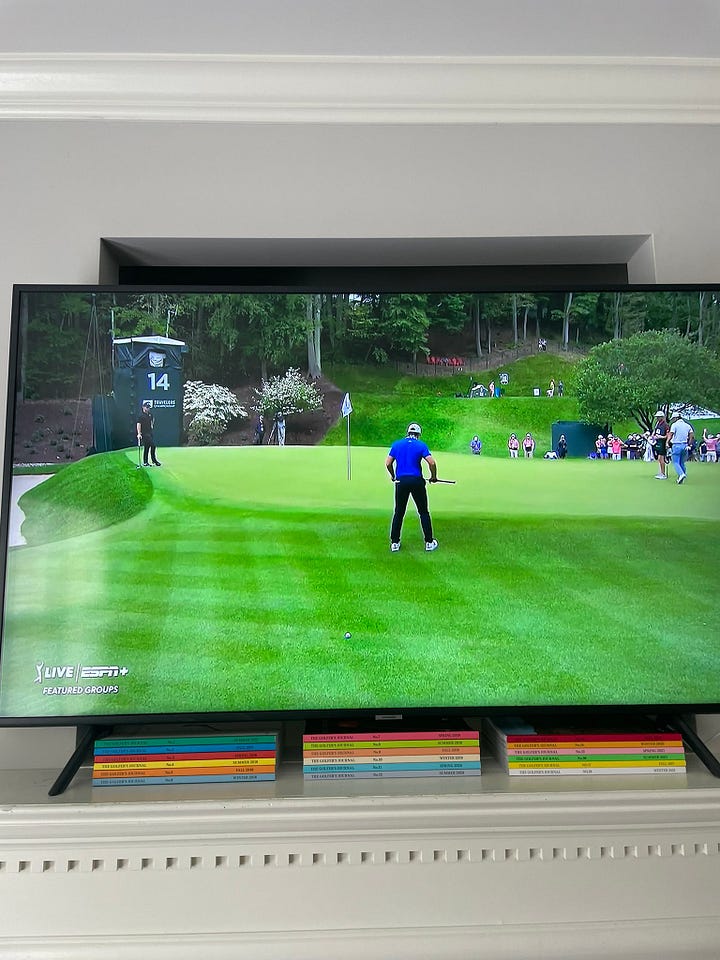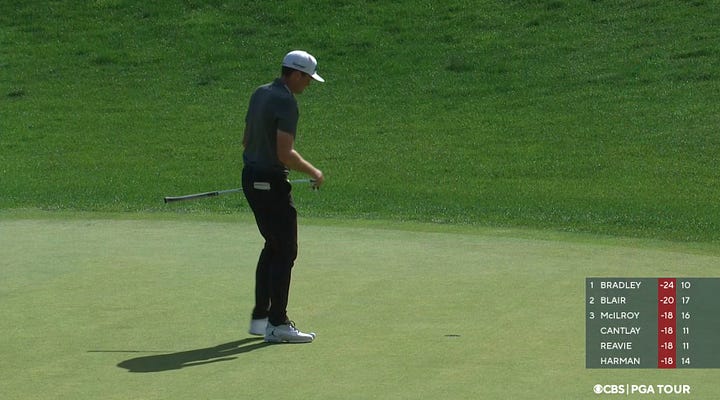Last week the final hours of the Wyndham Championship produced one of the wackiest Sundays on the PGA Tour in a long time. If the 36 plus hole marathon Sunday created by Hurricane Debby wasn’t enough, back nine leader Max Greyserman manufactured a geometry quiz on holes 13-16 in the final round, going hole out eagle, quad ⛄, birdie, four-putt double bogey. Aaron Rai made a great birdie in the dark on 18 ultimately giving him the victory, but another storyline emerged.
As most of you know, Matt Kuchar, playing in the final group, failed to finish the 18th hole Sunday evening and elected to finish the round Monday morning, holding the tournament hostage. This was after Kuchar seemingly hit into the penultimate group on the 18th, unknowingly and visibly frustrated about the situation. The difference between par and bogey in relation to his FedEx Cup status was minimal, and for a guy who’s made $60M in career earnings, the $100k spread is not an argument. Had Kuchar stated he was making a stand against slow play by not finishing, I would have been all in. Instead, he gave a laughable word salad excuse of, in summary, setting an example for Max Greyserman. Kuchar’s explanation and the whole scene was truly bizarre and was telling of his long recorded aloof personality.
The real issue with all of this is the final group teed off at 3:10ET, giving them roughly 5 hours 15 minutes to finish, and they still could not get it done. At one point during the final round, I was watching the tournament on a flight and fell asleep for 45 minutes. When I woke up, the final group had not even played one hole during that time. Groups were jammed up all day and even the CBS crew seemed fed up. You know when you get all-time nice guy Ian Baker Finch calling out people for slow play, it is a problem.
Slow play has always been an issue at any level of golf. What happens at the professional level generally trickles down to all other levels. I have heard a lot of PGA Tour players claim they used to be fast until they got on Tour, but realized it is actually more harmful to be a fast player. Playing fast is a skill, yet that skill is effectively punished at the professional level.
So how does the PGA Tour speed up play? The PGA Tour has a detailed pace of play policy, it’s just not enforced appropriately. The policy revolves around players Average Stroke Times (ASTs) and being penalized financially after their 10th infraction. These infractions seem to be the base punishment of the system’s policies. However, the PGA Tour has not actually stroked a player in over 1000 rounds. Until the consequence of slow play is actual shots instead of dollars, nothing will change. Unfortunately, in the bigger picture, $20k here and $5k there for players clearly does nothing. Stroking players has an immediate impact on a player’s tournament, and an exponentially higher monetary blow when the player is playing well.
A lot of the PGA Tour pace of play policy revolves around approach play and off the tee, but is much more ambiguous on the greens. If you go to a PGA Tour event, you’ll notice everything slows down on the greens. In 2022, the PGA Tour banned green reading books, which was an appropriate step at the time. The result of that ban is the Aimpoint system has now become the universal green reading system for professional players. This is the system where you see every player swaddling over their line with their feet and making Star Trek hand gestures. Aimpoint is adjacent to green reading books in that everything is measured off percentage of slope. The system is innovative, but players are now using it as a crutch, using Aimpoint from 2-footers to putts from off the green.


In addition to enforcement of policies with stroke consequences, Aimpoint needs to be banned. Simply put, green reading is a skill, not a calculation. Aimpoint goes against the principles of the sport and slows down play. Get rid of it.
I also want to abolish alignment aids on balls. Almost every player does this at the professional level, and now I see higher handicappers doing it at the recreational level. If you can mark a line on a ball, why shouldn’t you be able to line your feet up with a club on the course? (This is illegal by the way) It’s the same concept. Alignment is a great skill that, with a line used on the greens, is taken away.
I was always told by a great coach that if you are not good at matching up the ball line with your actual putt line, don’t use a line on your ball when putting. I see so many recreational higher handicappers trying to use a line on their ball that isn’t lined up anywhere close to where they want their actual start line to be. This visual mismatch creates subconscious compensation and over time hurts a player’s stroke. Lining up putts with a line also takes up too much time with players trying to make sure the line is exactly right. Yes, you need to mark your ball for identification purposes, but nothing more than that should be allowed.
As mentioned, slow play is a universal issue in golf. Until there can be some consistency in time across the sport, golf will suffer. 5, 6-hour rounds are ever present at public golf courses across the country on most weekends, especially at places where tee time spacing is miniscule. There are simple ways to speed up recreational rounds by golfers themselves, a few of which I’ve listed below.
Play ready golf. This is like beating a dead horse, but when it is your turn to play, have your yardage and club ready to go.
Don’t overlook for balls. The newest USGA rules allots 3 minutes for searching upon arriving in the area of the lost ball. Remember, this is recreational golf, so if nobody is behind you, sure maybe take an extra minute. But if the course is jammed and you are out of play, play your provisional or take a drop and move on after the short search. Also, if you are a playing partner, don’t get caught up in searching for someone else’s ball. Sure, be friendly and help, but if it’s not identifiable in the first couple of passes, go prepare to play your own ball.
Be aware of your personal pace and know your game. Again, there is a big difference between recreational and competitive golf. Personally, I’m all for playing by the rules and finishing out for true scores. That said, I usually play with players that, as a group, can keep up pace while doing this. Everyone has the right to score to the best of their ability, but if you are holding up your group and, more importantly, the people behind you, recognize that. Recreational golf isn’t the Masters folks…and your game isn’t more important than anybody else’s.
Walk! This sounds counterintuitive, but I’ve typically seen walking clubs have a much better pace of play. There is a lot of stop, go, and waiting with carts compared to walking which is a more universal flow. Walking allows time between shots. Carts also create reliance on partners where walking is every person for themselves. You might not be able to fly around in 2.5 hours like you could on an empty course in a cart, but on a crowded weekend day, I’ve found walking to be much more enjoyable and a consistent pace.
No need for storytelling when it is time to play shots. One of my biggest pet peeves is when there is an open tee box or playing area and someone is holding up the group from playing by blabbering away. When it is time to play shots, play shots. Storytelling can wait for the in between moments.
Golf is such an enjoyable game that, for many, can turn sour very quickly. Slow play has always been a big source of personal frustration for me in that regard. As a generally fast player, it can be mindblowing how some people can lack so much common sense and be so slow. Over the years, I’ve gotten better with it. At the end of the day, you’re just on a golf course longer, which isn’t necessarily a bad thing. So, if you’re like me and get truly baffled by slow play, it’s going to be alright. External factors are always out of your control, no matter how hard you try to control them. Let’s all just try to do our part, from top to bottom, and rounds will get moving a little bit faster.
Content for the Curious
🎧- Fried Egg Golf: A Look at High Level Amateur Golf
🎧- The Tie: Mac Todd: Urban Golf Performance Founder and CEO!
🎧- No Laying Up: Golf Sponsorships 101: Why Brands Sponsor Golf Events and Players




